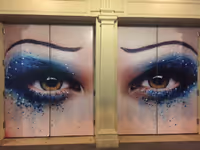NYT: The Broadway Musical Is in Trouble
Ensemble1711444445
Leading Actor Joined: 3/26/24
#75NYT: The Broadway Musical Shucked Tour troubles
Posted: 9/23/25 at 6:50pm
Ensemble1711444445
Leading Actor Joined: 3/26/24
#76NYT: The Broadway Musical Shucked Tour troubles
Posted: 9/23/25 at 6:54pm
JSquared2 said: "Ensemble1711444445 said: "Theater owners can help in a few ways...especially in the care and feeding of investors.
Cancel shows running at a loss. Moulin and Hells Kitchen and Cabaret are spending money that would otherwise go back to investors who are losing on most shows.
Extend shows (John Proctor) when they are making money and could recoup. Making Proctor close was cruel to those investors.
Start picking shows that have smaller budgets and lower running costs. Force producers to be smarter about the process. But also reward better managed shows -- too many shows are picked up for cronyism and that iscosting investors a fortune - Smash and Boop alone lost 50 million in a few months. This season looks dismally similar."
Oh my...there is so much misinformation and ignorance of how the business operates, I don't even know where to begin.
"
Clutching your pearls so early in the day. Please enlighten us. Or are you just going to be rude and dismissive without backing it up. Probably the latter. Or are you a producer that screws over his/her/their investors regularly?
mar6411
Broadway Star Joined: 9/19/09
#78NYT: The Broadway Musical Shucked Tour troubles
Posted: 9/25/25 at 12:04pm
Bandstand is phillypinto from the old days
SteveSanders
Broadway Star Joined: 3/29/25
#79NYT: The Broadway Musical Shucked Tour troubles
Posted: 9/27/25 at 12:12pm
And Michael Reidel weighs in on the subject in The Times (UK):
Sub-hed:
"Unoriginal musicals, soaring ticket prices and a declining New York have been a recipe for disaster."
Article closing excerpt:
"Nobody on Broadway seems to have a clue about how to lower production costs so that exciting, original musicals can flourish and audiences can afford to come. Producers could drive harder bargains with labour unions, whose leaders justifiably point out that their members went without incomes during the pandemic. But that might lead to strikes, and neither side wants Broadway to go dark again.
"I suspect the business will muddle along until investment money dries up, attendance flattens out and theatres stand empty. That’s not going to happen right away but if theatre people look up, they’ll see a curtain slowly descending."
BdwyFan
Featured Actor Joined: 3/1/10
#80NYT: The Broadway Musical Shucked Tour troubles
Posted: 9/27/25 at 1:38pm
Investor monies will only start to dry up once co producers are no longer eligible for Tony Awards. Just lead producers. They mostly only want to continue racking them up. So as long as the league allows status quo then investors and co producers will pretty much always be around. 🤔 I don’t see this rule ever ending for two simple reasons: the league needs the Tony award monies/revenues and lead producers still need co pros and investors. At the end of the day it’s a business.
SteveSanders said: "And Michael Reidel weighs in on the subject in The Times (UK):
Sub-hed:
"Unoriginal musicals, soaring ticket prices and a declining New York have been a recipe for disaster."
Article closing excerpt:
"Nobody on Broadway seems to have a clue about how to lower production costs so that exciting, original musicals can flourish and audiences can afford to come. Producers could drive harder bargains with labour unions, whose leaders justifiably point out that their members went without incomes during the pandemic. But that might lead to strikes, and neither side wants Broadway to go dark again.
"I suspect the business will muddle along until investment money dries up, attendance flattens out and theatres stand empty. That’s not going to happen right away but if theatre people look up, they’ll see a curtain slowly descending."
"
Ensemble1711444445
Leading Actor Joined: 3/26/24
#81NYT: The Broadway Musical Shucked Tour troubles
Posted: 9/27/25 at 1:49pm
SteveSanders said: "And Michael Reidel weighs in on the subject in The Times (UK):
Sub-hed:
"Unoriginal musicals, soaring ticket prices and a declining New York have been a recipe for disaster."
Article closing excerpt:
"Nobody on Broadway seems to have a clue about how to lower production costs so that exciting, original musicals can flourish and audiences can afford to come. Producers could drive harder bargains with labour unions, whose leaders justifiably point out that their members went without incomes during the pandemic. But that might lead to strikes, and neither side wants Broadway to go dark again.
"I suspect the business will muddle along until investment money dries up, attendance flattens out and theatres stand empty. That’s not going to happen right away but if theatre people look up, they’ll see a curtain slowly descending."
#82NYT: The Broadway Musical Shucked Tour troubles
Posted: 9/27/25 at 3:12pm
Ensemble1711444445 said: "Can someone send this to the theater owners...The four musicals working now are the low cost ones. Outsiders, Bobby Darren, Buena Vista and Maybe Happy - they had to work against the odds while Some Like it Hot, Smash and Boop had the red carpet rolled out for them - best theaters, long lead times. Death Becomes Her is the only big budget working - but will probably never recoup. The right shows and right budgets are out there but the theater owners are picking shows based on old models and old relationships- definitely notbest creative and not smart budgets."
There's a good deal of narrative-manufacturing in your post...
The 4 "low cost" musicals that you cite as "working" are all led by producers who have been around a long time and have longtime relationships with their respective landlords. Those are examples of old models and old relationships being successful. (If $800K a week running costs can be considered "low-cost"...these are, realistically, more in the medium-sized range.)
Those four shows were announced with a luxurious 5-7 months of lead time.
Those four shows are in theatres that work ideally for their scale and ambitions and timing. None of them are slumming it in their theatre. A show like MHE did not need or want the Imperial.
Shows like Boop, Smash, and Tammy Faye all seemed DOA last season. Others did, too (we all remember the MHE discussions), but it was no surprise when those shows folded.
Some Like It Hot was an anomaly because it was lead-produced by the Shubert Org, something they haven't done in years and might not do again.
The theatre owners and everyone else have known for years that small-to-medium-sized shows in a ~1,000-seat house can be a winning strategy on Broadway. But some shows need big productions and big orchestras, which mean they need bigger houses. There will always be a range of shows at small, medium, and large sizes on Broadway.
Ensemble1711444445
Leading Actor Joined: 3/26/24
#83NYT: The Broadway Musical Shucked Tour troubles
Posted: 9/27/25 at 3:52pmUpdated On: 10/7/25 at 03:52 PM
ScottK
Stand-by Joined: 12/13/12
#84NYT: The Broadway Musical Shucked Tour troubles
Posted: 9/27/25 at 6:51pm
Ensemble, if I may ask...what do you mean that you are "on some of them"? if you'd prefer not to say publicly, kindly dm
MezzA101
Broadway Legend Joined: 3/29/23
#85NYT: The Broadway Musical Is in Trouble
Posted: 9/27/25 at 8:15pm
Michael Riedel: Broadway can blame its greedy self for going bust
https://www.thetimes.com/us/opinion/article/broadway-can-blame-its-greedy-self-for-going-bust-50vtwnnzk
Jumpin_J
Stand-by Joined: 12/5/07
#86NYT: The Broadway Musical Is in Trouble
Posted: 9/28/25 at 6:01pm
Mostly agree with the article except for streaming. Yes, it can benefit shows that are established and it's great marketing. For shows that are struggling, not so much. Producers would need to negotiate additional SAG/AFTRA contracts with all the performers as well as broadcast rights with authors, composers, musicians, etc. which would send costs soaring. With budgets as high as they are, I don't see this as an option.
Jarethan
Broadway Legend Joined: 2/10/11
#87NYT: The Broadway Musical Is in Trouble
Posted: 9/28/25 at 6:37pm
MezzA101 said: "Michael Riedel: Broadway can blame its greedy self for going bust
https://www.thetimes.com/us/opinion/article/broadway-can-blame-its-greedy-self-for-going-bust-50vtwnnzk"
I thought that this was actually a very good article, even if I don't want it to be.
#88NYT: The Broadway Musical Is in Trouble
Posted: 9/28/25 at 7:47pm
Jarethan said: "MezzA101 said: I thought that this was actually a very good article, even if I don't want it to be."
It is a very good article. My only quibble is that although Riedel speaks accurately of localized costs (i.e., ticket prices, theater owners, and union wages), he leaves out the additional costs to patrons who live outside of NYC (i.e., air fare and lodging). everything combined make it a complete impossibility for someone like me to see a Broadway show on Broadway ever again.
I thought this quote was interesting: "The great director Hal Prince once said that, in theatre, 'it’s not enough to give people what they know — you have to give them something they can’t even imagine.'”
Shouldn't that always be the goal (or at least the standard to strive for most often)?
#89NYT: The Broadway Musical Is in Trouble
Posted: 9/28/25 at 9:32pm
Does someone please gift that article
bear88
Broadway Legend Joined: 4/26/16
#90NYT: The Broadway Musical Is in Trouble
Posted: 9/29/25 at 1:44am
As an outsider, I feel like I need to read between the lines to get a sense of Broadway’s problems, at least for new musicals. Some of the culprits seem a bit too convenient while other issues mentioned only in passing - especially in the Times story (not Riedel’s) contrasting London’s relative success with Broadway’s problems - seem worthy of more attention even if they aren’t new.
- The cost of materials. This is just basic inflation of basics like wood. It increases the cost of shows without adding value. I’m not sure how much of a factor that is, or why it would be especially harmful to musicals.
- Unions. They are a handy scapegoat but the existence of unions is not a new development on Broadway. How is it different this time?
- Government support. This is clearly a big difference between London and New York City (and the United States in general). The lack of government support for the arts isn’t new and is likely to get worse for the foreseeable future. The state government will have to decide its priorities there.
- Quality of shows. Riedel blames lazy producers for trotting out too many film adaptations and the absence of a musical like Hamilton that became a mega-hit. That’s all well and good, but it seems like the biggest problem isn’t that Broadway hasn’t produced hit shows but that it now takes years for successful musicals to recoup. Last season has several still-running new musicals that are selling well, but it’s my understanding that it will take 2-3 years for some of them to recoup even if they continue to perform as well as they have thus far. That’s a big ask, if true. I am less persuaded by the argument that shows are worse. Smash and other new musicals were always going to fail, either because they weren’t very good or because they weren’t the types of shows that would appeal to enough people.
- Landlords. Like unions, they make for an easy scapegoat, just from a different political perspective. Are they really asking for more?
- Other inflationary factors. I don’t really care about seeing celebrities in ‘just OK’ adaptations of plays, so those ridiculous prices don’t affect me. But I am sympathetic to John Adams about the cost of air fare and, especially, lodging. Hotel costs have skyrocketed during the past two years and it’s a bigger factor than the cost of theater tickets. I’m not sure what Broadway producers, landlords and unions can do about that.
Politics, fear of New York City, tariffs, et cetera. I remain of the view that the combination of these factors is hurting and can explain the difference between London and New York City. The criticism comes from all sides and often isn’t fair or is used as an all-purpose explanation for everything. When I was last in the city in April, it was far from deserted - and theaters were full. But I do think some foreign visitors aren’t coming, and that reduces the number of people buying pricey tickets to new Broadway musicals. I suspect it hurt the revival of Sunset Blvd., for example. There are fewer tourists in the U.S. It’s affecting other popular destinations so it stands to reason it would affect NYC.
My thoughts are just guesses by an outsider so I may be off-base. I feel like I’m still waiting for a story that fully summarizes and explains what’s happening - and what needs to change.
MezzA101
Broadway Legend Joined: 3/29/23
#91NYT: The Broadway Musical Is in Trouble
Posted: 9/29/25 at 6:43am
rosscoe(au) said: "Does someone please gift that article"
Which? Riedel piece? Not NYT. I'm not aware of a paywall.
Ensemble1711444445
Leading Actor Joined: 3/26/24
#92NYT: The Broadway Musical Is in Trouble
Posted: 9/29/25 at 11:32amUpdated On: 10/7/25 at 11:32 AM
#93NYT: The Broadway Musical Is in Trouble
Posted: 9/29/25 at 11:33am
https://www.removepaywall.com/
#94NYT: The Broadway Musical Is in Trouble
Posted: 9/29/25 at 11:42am
It is a very good article. My only quibble is that although Riedel speaks accurately of localized costs (i.e., ticket prices, theater owners, and union wages), he leaves out the additional costs to patrons who live outside of NYC (i.e., air fare and lodging). everything combined make it a complete impossibility for someone like me to see a Broadway show on Broadway ever again.
I found that really interesting as well considering Broadway sales are mostly from tourists from out of town and need accommodations. It wasn't the point of the article, but it's something worth talking about in the grand scheme of things.
#95NYT: The Broadway Musical Is in Trouble
Posted: 9/29/25 at 12:24pm
Ensemble1711444445 said: "Last new musical to recoup by Theater Owner:
Roundabout - &Juliet 2022/23 season (2 new musicals since)
Nederlander - MJ/Six 2021/22 season (5 new musicals since)
ATG - Moulin Rouge 2019/20 season (Hadestown year prior- 1 new musical since)
Shubert - Aint to Proud 2018/19 season (35 new musicals since- 3 could still recoup but unlikely)"
I think THE OUTSIDERS (Jacobs theater-Shubert) will eventually recoup.
I wish they included revivals recouping as well since they're still productions that need capitalization, etc. Of the revivals, how many actually recouped since pandemic? I think FUNNY GIRL was the only revival that recouped mainly thanks to Lea Michele.
Ensemble1711444445
Leading Actor Joined: 3/26/24
#96NYT: The Broadway Musical Is in Trouble
Posted: 9/29/25 at 12:29pmUpdated On: 10/7/25 at 12:29 PM
merle57
Understudy Joined: 9/9/24
#97NYT: The Broadway Musical Is in Trouble
Posted: 9/29/25 at 8:18pm
Hal Prince was absolutely correct -- give the audience something it does not expect. That's why all these movies being "adapted" by adding mediocre songs to the movie script does not work. Many of these stories do not "sing" or have a reason to "sing." Twice good writers have tried to crack Some Like It Hot, and both times the musical versions came up short. Bobby Morse was the only saving grace in Sugar. Legally Blonde, Mean Girls, Mrs. Doubtfire, New York, New York, even Death Becomes Her add nothing to the originals in musical adaptation. Oh Mary caught everyone by surprise -- which is why it delights audiences because it is well written and unexpected. So is Maybe Happy Ending, so is Hadestown. Audiences like to discover the show, not predict it before the curtain goes up.
Videos








